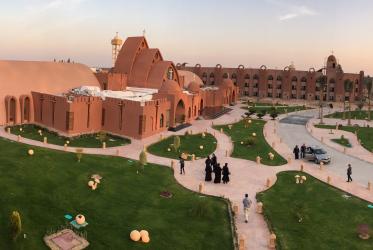Psalm 135; Ephesians 2.19-22; John 15.1-8
Opening Prayer
Faith and Order Plenary Commission
7 October 2009, Crete, Greece
The third edition of the Oxford Dictionary of the Christian Church defines ecclesiology as: “The science of the building and decoration of churches.”1 It goes on to explain that the word emerged in the 19th century when there was a renewed interest in ecclesiastical buildings! The article ends with the observation that “Nowadays the term more commonly refers to the theology of the Church.”2 This is a decided improvement on the 1974 second edition which says “the term (ecclesiology) is also sometimes used of the theology of the Church.” The 1957 first edition says nothing about theology.
The first ecclesiologist, St Paul, had no interest in ecclesiastical buildings or their decorations, which simply did not exist. Nor was he an academic theologian. He was an apostle, committed to nature and mission of the church in its daily life and work, even in the midst of controversy and division. The Letter to the Ephesians is one of the central New Testament texts about the theology of the Church and its unity. In it St Paul plays with different images and metaphors. He begins by contrasting being a stranger and an alien with citizenship and membership in the family or household of God; and here household in Greek is oikeioi, the root of the word ecumenism. Household then becomes a house, with foundations and a cornerstone: the apostles and prophets, with Christ Jesus as the cornerstone which holds the whole structure together. The Christian community is now a holy Temple, where God dwells.
St Paul presents the Church as part of God’s plan to create a new community in which the walls of religion and culture are removed. Paul’s theology of the Church is inseparable from its unity. In the Letter to the Ephesians, the work of Christian unity is not Paul’s, or the apostles, or the community’s for that matter. It is the work of God in Christ Jesus. In him the fundamental experience of divided humanity is removed. He is our peace. He is our cornerstone.
In the Gospel, St John proposes an image or metaphor of unity that is more organic: the vine and the branches. We are connected to each other because we are first connected to Christ, as surely as the branches in the vineyard are connected to one another because they are connected to the one vine. Mutual abiding in Christ is at the heart of ecumenical journey.
Today, the most important and vital work in ecclesiology arises from ecumenical dialogue: from the multilateral table of Faith and Order, as well as around the many tables of the bilateral dialogues. Like St Paul’s teaching about the Church, ecclesiology rooted in a vision of the full visible unity of the Church today emerges from the experience of division. And so in The Nature and Mission of the Church Faith and Order proclaims that “The Church is one because God is the one creator and redeemer, who binds the Church to himself by Word and Spirit and makes it a foretaste and instrument for the redemption of all created reality.”3
Questions about the Church, questions about ecclesiology rightly engage the best minds of theologians, church leaders, and ecumenists. As Dr Geoffrey Wainwright, a distinguished alumnus of this Commission wrote in 1983: “To seek and confess the ecclesiological location of one’s community is an act of discerning and proclaiming the gospel itself.”4
While The Nature and Mission of the Church and “Called to be the One Church” speak of ecclesiology in terms of koinonia or Communion, they also speak of the “attributes” of the Church, drawn from the Nicene Creed: one, holy, catholic, and apostolic. Different times and different traditions have accented different marks: apostolicity with mission; catholicity with doctrine; holiness with piety and ethical living; oneness with unity. All of these marks have their place in the modern ecumenical movement, and all have been the familiar territory of the Faith and Order Movement from its first World Conference in 1927 to this, the most recent meeting of the Faith and Order Commission. As Faith and Order has said in Confessing the One Faith: “… the Church can fulfil its mission to the world only in so far as it is itself continuously renewed as the one, holy, catholic and apostolic Church.”5 Such a renewal is always about abiding in Christ and here we touch prayer and ecumenical spirituality, which are as important as ecumenical theology.
In the Week of Prayer for Christian Unity in 2009, which forms the basis of our daily prayer at this Commission meeting, we hear words from the Hebrew Scriptures from the Prophet Ezekiel which are unusual in the context Christian unity: “That they may be one in God’s hand.” The choice of these words, which are the subtitle of our meeting this week, are surely a gift to the ecumenical movement from the churches of Korea, who proposed this passage to the Faith and Order Commission of the WCC and to the Pontifical Council for Promoting Christian Unity of the Catholic Church for the Week of Prayer for Christian Unity this year. This selection arises from the Korean experience of living in a country divided in half, with echoes in similar situations around the world; in Faith and Order we cannot but deeply appreciate the help of the country of our beloved Moderator Vasilios, and his native Cyprus. From the Prophet Ezekiel comes not only hope for divided nations, but also for divided churches: they shall be made one in God’s hand. This proclamation of God’s deep design for unity speaks not only of the unity of the Church, but the unity of humanity. Here there are strong resonances with the Fourth Assembly of the WCC in Uppsala in 1968, in its report “The Holy Spirit and the Catholicity of the Church,” and later Faith and Order work on Church and World: The Unity of the Church and the Renewal of Human Community, which point to the deep bond between the unity of the Church and the unity of humankind; they can never be permitted to drift from one another.
This vision of unity lies at the very heart of Faith and Order, whose own mission is “to proclaim the oneness of the church of Jesus Christ and to call the churches to the goal of visible unity in one faith and one eucharistic fellowship, expressed in worship and in common life in Christ, in order that the world may believe.” This vision of the unity of the Church from Faith and Order is integral to the World Council of Churches, and is included at the very beginning of our Constitution.
There is another biblical passage, and with it another glimpse on the nature and mission of the Church which goes to the heart of the matter in a different way, which like the Ezekiel passage has not made its way into the canon of the agreed ecumenical biblical texts. Like today’s reading from the Gospel of John, it too comes from the Last Supper narrative on the night before Christ’s suffering and death. Many of our churches read this passage every year on Maundy Thursday in Holy Week; I think we would do well to read it as well at every church meeting, as well as the Week of Prayer for Christian Unity:
I give you a new commandment, that you love one another. Just as I have loved you, you also should love one another. By this everyone will know that you are my disciples, if you have love for one another. (John 13.34-34)
The work of Faith and Order can only achieve consensus when it works in love. You may reach an agreement this week on the Sources of Authority and the place of the teachers and early witnesses of the Church. You may find agreement this week on how best to proceed on questions on Moral Discernment in the Churches. You may arrive at a clear, fresh direction on how to proceed on the work of ecclesiology this week. But if these things are not done in love, then they are merely clever. The conversation and agreements reached here will not mend the broken stick; they will not come from an abiding in Christ, the vine and the cornerstone. They will not advance unity so that the world may believe; no one will know that you are His disciples, if you have not loved one another as Christ loves each of you.
What might this love look like at a Faith and Order Plenary Commission meeting? It does not mean an absence of disagreement or difference, but only when these take on the spirit of quarrelling or jealousy. It does mean a spirit of respect, tolerance, forgiveness, and care for the other. It means listening to the other. If you leave here and you don’t miss each other, then you have not loved one another. You will have remained strangers and aliens to one another, and have fallen short of the vision of the household of God built on the foundation of the apostles and prophets, with Christ Jesus as the cornerstone.
What the 2006 Assembly of the WCC said in Porto Alegre to the divided churches in its text on ecclesiology “Called to be the One Church”, applies equally to this multilateral theological commission of the representatives of those churches gathered here:
Divided churches express mutual accountability and aspects of catholicity when they pray for one another, share resources, assist one another in times of need, make decisions together, work together for justice, reconciliation, and peace, hold one another accountable to the discipleship inherent in baptism, and maintain dialogue in the face of difference, refusing to say ‘I have no need of you’ (1 Cor. 12:21). Apart from one another we are impoverished.6
Anything less, betrays the nature and mission of the Church. “By this everyone will know that you are my disciples, if you have love for one another.” May this commandment, through the help of our good Lord, be firmly rooted in our hearts during this Faith and Order meeting, and in our lives always.
Amen.
1 Cross & Livingstone, eds., Oxford Dictionary of the Christian Church , Third Edition (Oxford: OUP, 1997), p.526
2 Ibid.
3 The Nature and Mission of the Church, Faith and Order Paper 198 (Geneva: WCC, 2005), p. 14.
4 Geoffrey Wainwright, The Ecumenical Moment (Grand Rapids: 1983), p. 190.
5 Confessing the One Faith: An Ecumenical Explication of the Apostolic Faith as it is confessed in the Nicene-Constantinopolitan Creed (381), Faith and Order Paper No. 153 (Geneva: WCC Publications, 1999), p. 89.
6 Text on ecclesiology : Called to be the One Church



